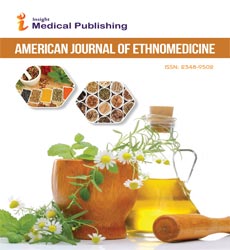ISSN : 2348-9502
American Journal of Ethnomedicine
Biodiversity Agreements and Ecological Diversity
Janet Amaral*
Department of Pharmacognosy, RJK University, Illinois, United States
- *Corresponding Author:
- Janet Amaral
Department of Pharmacognosy, RJK University, Illinois, United States
E-mail: amaraljanet@lim.edu
Received Date: August 06, 2021; Accepted Date: August 20, 2021; Published Date: August 27, 2021
Citation: Amaral J (2021) Biodiversity Agreements and Ecological Diversity. Am J Ethnomed Vol.8 No.7:004.
Abstract
Abstract
“Biodiversity, Bio prospecting and Development" is a good background for evaluating the imporatnce of biodiversity and its impact on social development, including economic development, from a scientific perspective. Humans have been using natural resources because they are part of the environment and will inevitably interact with them. Food, medicine, and housing all are originated in nature.
Keywords
Development; Ethnobotany; Pharmacology
Description
Importance of biodiversity
In the evolution of human society, the use of natural resources based on direct experience has become a use based on cultural traditions and then on scientific research and empirical evidence. It is very important to understand the role of ethnic science and other social sciences in the development of human society and the importance of science reflected in scientific publications. Conflicts of interest between different participants in bioprospecting have begun. Due to the participation of ethnic science, social participants have played a relevant role. We posed this question in the best possible way in this editorial article: this magazine. Although the concept of bioprospecting is relatively new, it is actually an ancient activity that began when humans began to use natural resources. This concept involves the search for biochemical and genetic resources of economic value, and is based on scientific research, biodiversity analysis, and popular culture. Resources are initially determined through experience and are divided into medicines, food, poisons and glue for hunting, hallucinogens or "spiritual" substances.
Experience, information and their interrelationships are conducive to the development of popular culture and the use of natural resources. According to this ancient origin of bioprospecting, all aspects of botany, anthropology, archaeology, photochemistry, pharmacy, history, geography, ecology, and other fields of art and science are considered. Some sciences belonging to ethno botany and ethno pharmacology can actually be considered as the origin of modern biological instructions, because they help to discover many important herbs that make bioprospecting possible. Ethno botanists study the uses and concepts of plants in culture and society (popular knowledge), and ethno pharmacologists study the medicinal uses and properties of plants from popular culture data. Ethnobotany has now evolved into a broader concept that includes not only the utilitarian relationship, but also other ecological and cognitive concepts, as well as the relationship between humans and plants in the modern environment. According to the statutes of the International Society of Ethnopharmacology, ethnopharmacology has also developed from a classical concept to a modern concept, but the changes are easier than ethnobotany. Initially, it was understood as a multidisciplinary research field involving the observation, description, and experimental research of indigenous drugs and their biological activities.
Modern ethno-pharmacology
The definition now includes interdisciplinary research on the physiological effects of plants and other organisms or substances that were used in local medicine in the past and are used in culture today. Modern ethnopharmacology includes the fields of botany, ethnobotany, phytochemistry, ethnopharmacology, pharmacology and toxicology. Like all ethnic sciences, ethnobotany and ethnopharmacology have common humanities and cultural elements. Later, a new term appeared, bioprospecting. This concept includes the procurement of biodiversity information, cultural information, and products of economic value. When the purpose and results of ethnic science, experimental and basic science, and technology have commercial value, the activity is now called bioprospecting. The term is also used to research and develop biodiversity itself for commercial purposes.
Conclusion
Bio prospecting was initially seen as a reasonable and win-win result, because its results benefit the scientific community and society as a whole. Over the past few decades, this new science has become increasingly important due to technological advances in pharmaceuticals, biotechnology, and agriculture. Due to the improper distribution of economic benefits of natural resources and the damage that may be caused to the environment by over-exploitation, conflicts of interest arise.
Conflict of Interest
The authors declare that there was no conflict of interests.
References
- Erakpotobor IGT, Osuhor UC, Olugbemi TS (2006) Performance and digestibility of weaner rabbits fed graded levels of soyabean cheese waste/maize offal diet and brachiaria grass hay. Afr J Biotechnol 5(17): 1579-1583.
- Spring (2005) Okara-overview of current utilization. Soy 20/20 5thEdition1-19.
- USDA (2015) National nutrient database for standard reference. Nutrient Data Laboratory.
- Association of Official Analytical Chemist (2012) Official methods of analysis. 20th edition.
- Joseph AM (1982) Phytate: Its chemistry, occurrence, food interactions, nutritional significance, and methods of analysis. J Agric Food Chem 30(1): 1-199.
- Gopal K, Ranijhan SK (1980) Laboratory manual for nutrition research. Vikas Pub 1(1): 1-134.
Open Access Journals
- Aquaculture & Veterinary Science
- Chemistry & Chemical Sciences
- Clinical Sciences
- Engineering
- General Science
- Genetics & Molecular Biology
- Health Care & Nursing
- Immunology & Microbiology
- Materials Science
- Mathematics & Physics
- Medical Sciences
- Neurology & Psychiatry
- Oncology & Cancer Science
- Pharmaceutical Sciences
